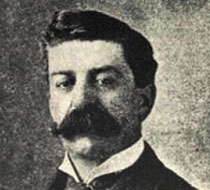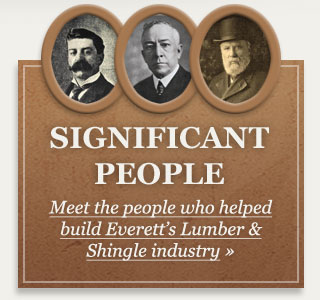-

James E. Bell
The operator of the first industrial plant in the North Waterfront, James E. Bell had a colorful and diverse career as a business and civic leader.
-

James J. Hill
James J. Hill never lived in Everett, rarely visited the city and never owned or operated an Everett mill. But this captain of industry was more responsible than anyone for the development of the wood products industries on Everett’s waterfront.
-

John T. McChesney
Once James J. Hill had formed the Everett Improvement Company, he needed someone in whom he had the utmost confidence to run it. The man he chose was John T. McChesney. In his early 40s at the time, McChesney had been a bank president, mayor of Aberdeen, South Dakota, and head of the syndicate that organized Chattanooga, Tennessee, before he came to Everett in late 1899.
-

David M. Clough
It is said that David Clough fist arrived in Everett via the personal railroad car of James J. Hill. The former governor of Minnesota and a respected lumberman, Clough had the credentials Hill was looking for in men who would transform the city into a mill town.
-

Roland H. Hartley
Son-in-law of David Clough, Roland Hartley was the other key member of the family lumber and shingle dynasty. Born in Shogomoc, New Brunswick, on June 26, 1864, Hartley was on his own at age 13, working in a northern Minnesota lumber camp.
-

Olof Carlson
Few immigrants arrived in America more tumultuously than Olof Carlson, born in Gottenborg, Sweden, on November 30, 1860, to a sea captain and his wife. Carlson was reportedly a cook on a vessel that was pounded to pieces by a violent storm in 1880 off the Oregon coast.
-

Neil C. Jamison
Neil Jamison was born in June 1886 in Minneapolis, Minnesota, to a prominent family of that city. His mother, born in Vermont, was of English descent. His father was an attorney who became a district court judge. After completing studies at Amherst College in Massachusetts, Neil Jamison came to the Pacific Northwest.
-

Fred K. Baker
Born in Fleming, New York, on January 5, 1861, Fred Baker came to Everett in 1901 and founded the Ferry-Baker Lumber Company. The Ferry-Baker mill took over the plant of the former Rice Lumber Company on the Snohomish River.
-

The William Hulberts
William Marion Hulbert was born of Scotch lineage in Brown County, Kansas in 1858. The Hulbert name was said to be derived from an ancient Scottish weapon, the whirl bot, which whirled through the air when it was thrown at the enemy. William Marion was just two years old when his family, braving an attack by Native Americans along the way, migrated to the West Coast.
-

William C. Butler
William Butler never headed a North Waterfront mill. As Everett’s all-powerful banker, however, he controlled the destinies of men and mills. Born on January 27, 1866 in Paterson, New Jersey, to a prominent East Coast family, Butler was in his mid-20s when he came to Everett during the city’s early boom days.
-

Ernest P. Marsh
In a demonstration that workers could be just as migratory as managers, Ernest Marsh was a shingle weaver at three 14th Street Dock shingle mills from 1901 to 1908. In 1909, he left the dock and soon became a union official. By 1910 he was the editor of the Labor Journal and secretary-treasurer at the Labor Temple.

